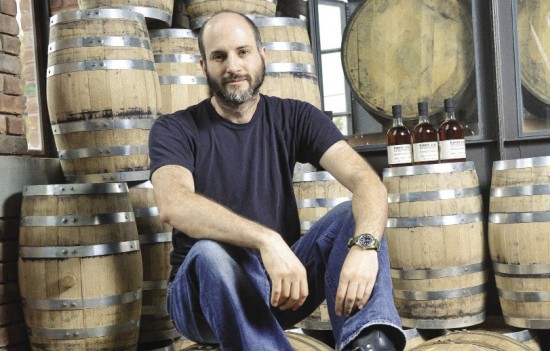Daniel Preston’s life sounds like a work of fiction.
Faced with “a crazy five-year noncompete” as part of the terms of the sale, he turned to a new source of inspiration: his family’s hundred-year-old organic cacao farm in the Dominican Republic. He threw himself into creating better farming systems—and better chocolate—and by 2010 he’d built a factory in Red Hook that was in full swing producing fine confections.
Last year, the 007 adventurer also got a license to distill.
Many distillers would turn Chartreuse green with envy over the resources at command for Cacao Prieto; five minutes at the Red Hook distillery and I feel a bit dizzy from the bounty. There’s the chocolate-making facility, which flows seamlessly into the distilling area, dominated by the amber-red glow of tall copper-pot stills. Next door is Lingua Botanica (“language of plants” in Latin), a bright glass-walled bar open only during warmer weather that serves herb-inspired cocktails. Around the corner is the apothecary-style production lab.
Although it looks more quaintly suited for cocktail experiments, Cacao Prieto is actually part of a larger game plan of Preston’s, which includes Cacao Biotechnologies, responsible for discoveries like a cacao-based compound that Preston says boasts antioxidant properties 1,000 times that of green tea, as well as an antiviral product with potential to combat human papilloma virus, not to mention 40 cacao-related patents.
“The food side is what everyone sees, but there’s a lot going on below the surface,” says Preston when he greets me at the distillery, nibbling a square of chocolate, and explains that the whole project was born out of his family’s farm—where he decided that processes were ripe for change.
“Cacao trees are pretty magical,” says Preston. “They look like apple trees but with colorful football-shape pods.” Traditionally, the pods would be cracked open in the field and left to ferment for days, creating an alcoholic (and contaminated) by-product called “sweatings” that farmers simply discard.
“This struck me as unbelievable,” says Preston. “Several thousand years of recorded history on fermented foods and science…. None of which seemed to be applied to the cacao industry.”
So, being Preston, he set out to re-engineer the process. First he came up with a system for cloning high-quality plants to ensure the preservation of heirloom cacao varietals (which Preston says will lead to millions more cacao trees over the next decade). Then he set to work turning the sweatings from trash into treasure.
“I adopted pharmaceutical fermentation techniques as well as winemaking techniques,” he says. “The result was a huge amount of control over the resulting flavor and organoleptic properties of the beans. The by-product was no longer smelly waste but fragrant wine.”
Even that was just the beginning—next he distilled the wine into brandy and later rum, and Cacao Prieto Distillery was born.
Today the Cacao Prieto line, sold at the Red Hook home base and in Dry Dock Wine + Spirits down the street, includes Preston’s flagship bottles of cacao-infused rum, luscious liqueur and, launched in October, Widow Jane Kentucky Bourbon Whiskey, created with advice from famed whiskey master distiller Dave Pickerell. The whiskey’s ingredients include GMO-free corn and water from the Widow Jane mine in Rosendale, New York—an unusual limestone-rich source similar to that in Kentucky. The whiskey has been a runaway hit: “Demand has been more than we can make,” he says. (The branch water is also available by the bottle.)
A cacao-infused rye is slotted to follow in the near future and, true to his nature, Preston has several other products in various stages of development: a straight rhum agricole; herbal liquors, including chamomile rum and Mama Juana (a traditional Dominican liqueur) and a Brooklyn-made version of the classic Chartreuse liqueur, made using a recipe from a 200-year-old manuscript purchased in rural France.
“I psychotically and systematically contacted every antique book store in France, never dreaming to find what I did,” he marvels. “Months of insomnia, research and work paid off—I bought it the second I found it.”
All these spirits are intended to be faithful reproductions of traditional recipes, many taken from old books and manuscripts. Why do it this way?
“It’s fun. It’s a retirement career. I can do it the way I want,” Preston pauses for a moment, the scent of chocolate lingering in the air, “because I can.”
Photo credit: Max Flatow



